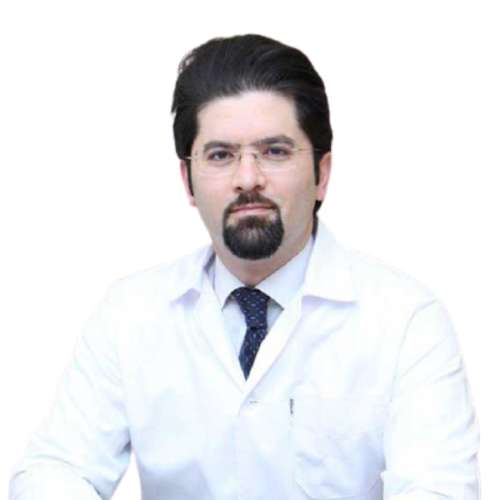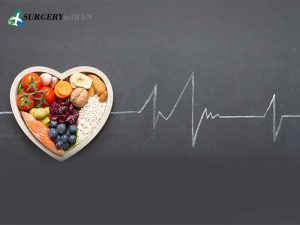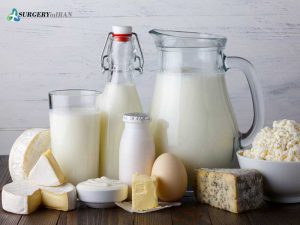Nutrition after heart surgery
For human blood to be able to communicate with and feed all the cells in the body, it needs a powerful pump that can move about 2 million liters of blood annually. The heart does this vital work in the body, and its speed varies from person to person, depending on factors such as gender, activity level, health status, and the use of certain medications and heredity. A healthy heart beats about 100,000 times a day, delivering oxygen-rich blood and nutrients to the organs 24 hours a day. The human heart is referred to as the body factory and therefore maintaining its health is one of the most important tasks to preserve life. Today, one of the leading causes of death in the world is the prevalence of cardiovascular disease due to incorrect changes in lifestyle and nutrition.
Cardiac surgery is a very common and trivial operation in the world these days and the success rate of most surgeries is high and without risk. Many heart problems cause your doctor to recommend open surgery. One of them is the blockage of the main arteries of the heart, which is not opened by a spring and medicine, and the doctor is forced to open the chest. Nutritional care after open-heart surgery can be said to be much more important than what needs to be done before surgery. What is important here is to change the postoperative lifestyle to avoid re-involvement and longer life expectancy. The patient and his companion should follow all the recommendations to reduce the risk of re-infection.
Nutritional recommendations
Avoid fast foods and processed ingredients such as sausages, canned foods, sauces, sauces, industrial juices, diet drinks, chips, and frozen foods, and ice cream.
– Quit smoking and hookah completely
– The use of low-salt foods is recommended. Salt or sodium chloride causes an increase in sodium in the blood and puts a lot of pressure on the arteries and heart and raises blood pressure, and this is very harmful to the patient. The permissible amount of salt for sick people is about 4 grams per day. The same amount should be avoided as much as possible.
– The use of unsaturated oils, which are usually liquid and vegetable, should be used in daily cooking. Olive oil, sesame oil, sunflower oil, and so on. Again, it is better to use grilled, cooked, and cooked foods instead of fried and oily foods. The use of butter should be completely forgotten.
– It is very useful to use protein such as white chicken and fish and a little red meat. Proteins strengthen the heart muscle and keep the infection away and heal faster after surgery. Fish is the number one protein because it is high in omega-3s, lowers cholesterol, and keeps the heart-healthy. Red meat, whether grilled or cooked, has a significant amount of fat and increases the risk of recurrence of heart attacks. It is better for people over the age of 50 to reduce the consumption of this type of meat to once a week. You should also try to use organic meat and poultry that have not been fed any antibiotics or chemicals during this time. Today, this type of meat is available in many markets.
– Consumption of yogurt and low-fat milk
Milk protein is very high and strengthens the heart muscle and reduces bad cholesterol in the blood. Milk and yogurt are rich sources of vitamins and minerals, calcium and vitamin D. Dairy products reduce blood sugar due to their high omega-3 content and greatly improve heart health.
– Fresh fruits and vegetables
These substances are a rich source of vitamins and nutrients and are at the top of the diet list after heart surgery. They help a lot in raising the level of immunity because health is very important after this surgery and even a simple cold should be prevented. Fruits and vegetables such as:
Carrots, which are rich in carotenoids and are considered an antioxidant and ensure heart health.
Garlic has antimicrobial properties and helps prevent infection.
Onions are rich in sulfur and lower blood cholesterol levels. It is better to eat it daily with food and raw, but to the extent that it does not cause stomach upset and bloating.
Tomatoes contain lycopene and are essential for heart health
Capsicum, which contains folic acid and lowers homocysteine levels. Homocysteine is an amino acid in the blood that increases the risk of stroke if its level rises. Asparagus has the same benefits as tomatoes.
Leafy vegetables such as lettuce and celery are high in magnesium and prevent sudden cardiac arrest.
Fruits are useful snacks
Apples contain a significant amount of flavonoids and therefore prevent blood clots in the arteries and also cause the arteries to dilate.
Bananas contain vitamin C, folic acid, fiber, magnesium, potassium, all of which somehow improve heart health after surgery.
Cantaloupe contains vitamin C, A, and potassium
Berries are rich in antioxidants and increase beneficial cholesterol, reduce harmful cholesterol, and lower blood pressure.
– Portugal, grapes, kiwi, peaches and watermelon must be included in the diet.
Never forget to eat a handful of oilseeds, such as walnuts and almonds, as a snack a day.
Whole grains
Cereals such as rice, brown rice, barley, quinoa, and legumes including beans and lentils Fiber should be used extensively to improve immune system health and prevent constipation and dryness. It is also best to eat less refined carbohydrate foods such as white bread and baguettes and biscuits.
Some doctors believe that you should start your day with a bowl of oatmeal to curb anorexia and prevent false obesity.
In general, after open-heart surgery, a person has many problems such as nausea, constipation, swelling, loss of appetite, and depression, and because his recovery period is longer than other surgeries, the patient may have the dos and don’ts of this period. Tired and refuse. He should reduce his meals but increase their number and not pay attention to his lack of appetite. Drink plenty of water and healthy drinks. Take all your medications according to your doctor’s instructions regularly and accurately, and be sure to take them with a full stomach so that you do not suffer from digestive disorders and the pain does not leave you with heartache.
Start walking every minute of the day and gradually lengthen it to have a healthy digestive function and circulation. Adequate sleep and rest and avoidance of any stress and bad news are highly recommended after surgery.



















